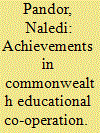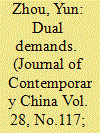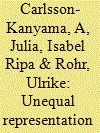|
|
|
Sort Order |
|
|
|
Items / Page
|
|
|
|
|
|
|
| Srl | Item |
| 1 |
ID:
091952


|
|
|
|
|
| Publication |
2009.
|
| Summary/Abstract |
The Singapore and Harare Declarations proclaim the Commonwealth values and principles to which South Africa adheres. The Aso Rock Declaration shows that good governance can overcome poverty. There is a potential crisis of poverty and inequality, in which education should be given priority. The Commonwealth needs to advocate gender equity and emphasise the interdependence of the primary, secondary and tertiary sectors. It should find cheaper methods in secondary education and more open schooling.
|
|
|
|
|
|
|
|
|
|
|
|
|
|
|
|
| 2 |
ID:
169136


|
|
|
|
|
| Summary/Abstract |
It appears that an almost unquestioned development pathway for achieving gender equity and women's empowerment has taken centre stage in mainstream development. This pathway focuses on economic outcomes that are assumed to be achieved by increasing women's access to material things, including cash income, loans, physical assets, and to markets. Gender equity indicators, which measure progress towards these outcomes, cannot escape reinforcing them. We argue that far from being neutral, indicators are embedded in political and ideological agendas that serve as guides to the appropriate conduct of those whose performance or behaviour is being measured. Drawing on participatory feminist, diverse economies and strengths based approaches, we outline a research methodology for developing community‐based indicators that recognises women's and men's participation and relationships in all spheres of life, including the ‘non‐economic’. If indicators are grounded in local meanings and realities, we propose that community members can use them to identify aspirational goals for gender equity, and measure progress towards these goals.
|
|
|
|
|
|
|
|
|
|
|
|
|
|
|
|
| 3 |
ID:
128859


|
|
|
|
|
| Publication |
2014.
|
| Summary/Abstract |
Does women's empowerment strengthen global good citizenship? We test theories of democratic foreign policy and feminist international relations that suggest that more deeply democratic countries with greater gender equity will be stronger international human rights promoters. First, the direct empowerment of women as policymakers and civil society constituencies may shift states' incentives and ability to pursue international human rights initiatives. Second, greater sexual equality may lead to feminist socialization of the wider society to promote human rights values. We test these predictions by measuring the relationship between five different measures of sexual equality and a country's propensity to support 30 international human rights outcomes, including legal commitments, humanitarian assistance, and sanctions, controlling for previously established contributing factors such as level of development and democratic regime type. We find that more sexually equal countries are more likely to support international commitments to constrain state violence against individuals, international measures to combat gender and sexual orientation discrimination, and more and higher quality development assistance. However, sexual equality appears to yield less benefit for more costly human rights initiatives: yielding sovereignty to international legal institutions, promoting economic rights through concessionary trade policies, or adopting diplomatic sanctions against pariah states. These effects are stronger in democratic states, where citizen empowerment translates more readily into foreign policy, and are also found in a sample that excludes the Western powers.
|
|
|
|
|
|
|
|
|
|
|
|
|
|
|
|
| 4 |
ID:
164760


|
|
|
|
|
| Summary/Abstract |
This article investigates fertility intentions and obstacles among young Chinese men and women after the lift of the one-child policy. Over 100 in-depth interviews reveal that while having one child is viewed as the normative step following marriage, various obstacles remain for second-birth transition. Time and financial concerns are salient among both men and women, whereas labor market disadvantage and the perceived incompatibility between work and motherhood create additional hindrances for women. The gendered childcare leave policy, coupled with discriminatory hiring practice, leads women to view multiple childbirths and successful career as fundamentally incompatible. A universal ‘two-child policy’ without additional institutional measures that address work-life incompatibility for women may not successfully boost fertility level, but would rather exacerbate the existing gender inequity in China’s labor market.
|
|
|
|
|
|
|
|
|
|
|
|
|
|
|
|
| 5 |
ID:
097503


|
|
|
|
|
| Publication |
2010.
|
| Summary/Abstract |
This survey shows that female representation in boards and management groups of large energy companies in Germany, Spain and Sweden is far from being gender-equal. Of the 464 companies surveyed, 295 (64%) had no women at all in boards or management groups and only 5% could be considered gender-equal by having 40% or more women in such positions. Interviews with energy companies confirmed current trends that gender equality efforts within decision-making in business are weak or non-existent. The findings are discussed against the background of differences in risk perceptions among women and men, evidence of women's impact on boards and companies' performance and the substantial risks related to unabated climate change. Research is suggested for exploring potential impacts on energy companies' performance with more women in the boards when it comes to mitigation activities.
|
|
|
|
|
|
|
|
|
|
|
|
|
|
|
|
|
|
|
|
|